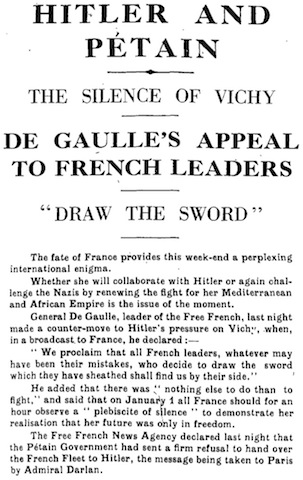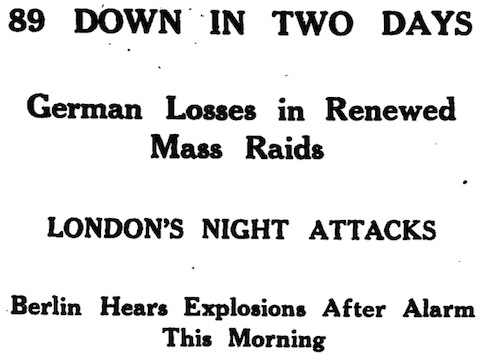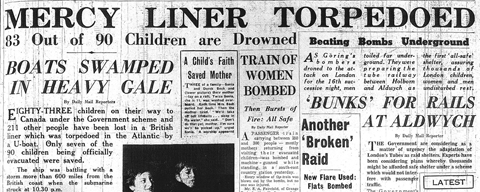
President Roosevelt had one of his famous ‘fireside chats‘ (i.e. over the radio) with the American people last night. This one would seem to deserve its lead-story status in the Manchester Guardian, as he firmly committed the United States to Britain’s side in the war, even if not as a non-combatant but as the ‘arsenal of democracy’ (5), producing the weapons needed to beat Hitler. ‘There can be no reasoning with incendiary bombs’, Roosevelt said. If Britain fell, America would have to face the Nazis alone, and ‘to survive in such a world of “brute force” the United States would have to become permanently a militaristic Power’. Early signs are that this is a popular policy; the isolationists are becoming, well, isolated.
The other big news is that London was heavily bombed last night. According to the Guardian,
The raid, though not the longest, was one of the most intense the capital has experienced. The “alert” was the earliest for some time, but the “raiders passed” was sounded before midnight.
The German ‘planes adopted their familiar tactics of dropping showers of incendiaries, followed by high-explosives.
It’s not clear what the damage is. A Wren church was hit, two hospitals, a trench shelter. The bombing was reported to be ‘severe’.
The Tubes were probably fuller than at any time since night raiding on London began. Large numbers of people who had no shelter or bunk tickets stood in rows beside the passage-ways used by travellers.
Roof-watchers’ amply proved their worth’, putting out any incendiaries within reach. But still, fires were started and the firemen were busy, as ‘more incendiary bombs than ever before were dropped’. One reporter wrote that
“Firemen and A.F.S. men climbed over roofs and leaned perilously out of windows to deal with the incendiaries. As fast as they extinguished them, however, the air became filled with the clatter of another ‘Molotoff bread-basket.'”
The Guardian‘s first leading article examines ‘the new German method of the long and heavy night raid on one place, in which the fire bomb has the most destructive part’ (4). It concludes that, ultimately, householders and business-owners must realise that ‘Their first protection against fire is not the brigade, it is themselves’.
The fire bomb, in the long run, is the worst thing that falls; only civilians are plentiful enough to take responsibility for it.
Coincidentally (well, not very) there’s a lot in today’s papers about other things which need to be done before, during, and after air raids. Evacuation of children from Manchester has become an issue since last week’s heavy bombing. At least the city’s education committees think it should be: they have been repeating an earlier survey of parents to see who ‘might be registered for evacuation at the moment when the authorities deem it advisable’ (6). The results are described as ‘disappointing’, with only 9600 Manchester children registered out of a total of 82000. Oddly this is lower than the total for the previous registration earlier in the year, suggesting parents have changed their minds and want to keep their kids at home with them.
As Alderman Mary Kingsmill Jones remarked, “It would seem that they have not learnt any lesson from the raids.”
A letter to the Guardian from seven Oxford students ‘who have been working in shelters in London’ (Joy Adams, Elizabeth Bayley, Arthur K. French, Graham Harper King, B. B. Lloyd, E. L. Moor and Basil S. Moss) appears on page 8. It blasts local authorities in London for neglecting the problems of ‘inadequate sanitation and ventilation’:
Do the authorities really think that twelve sanitary buckets are sufficient for two thousand people? Do they really think that the Tubes are in the nature of things well supplied with fresh air?
The well-being of shelter occupants ‘is not helped by bad sanitation, damp, dirt, and exhausting congestion’. (Adams et al. do not note, though they might have, that in one week from now the Blitz will have been going for three months.) And in Liverpool, the Civil Defence Emergency Committee is turning to the problem of housing those made homeless by bombing. It is waiting for approval from the Ministry of Health for its plan of building ‘a thousand bungalows on sites near existing housing estates’. By using as little timber as possible and building to a standardised design, it is estimated that ‘at least five hundred dwellings could be erected in four months’.

This advertisement from the National Savings Committee appears on the front page of the Guardian (where I nearly missed it). The quotation is a translation from ‘Gray’s ‘Luna Habitabilis’, Cambridge 1737′ and reads:
The time will come, when thou shalt lift thine eyes
To watch a long-drawn battle in the skies,
While aged peasants, too amazed for words,
Stare at the flying fleets of wond’rous birds.
England, so long the mistress of the sea,
Where winds and waves confess her sovereignty,
Her ancient triumphs yet on high shall bear,
And reign, the sovereign of the conquered air.
‘Make it come true!’ – ‘Save every shilling you can and lend it to the Nation!’
![]() This work is licensed under a Creative Commons Attribution-NonCommercial-NoDerivatives 4.0 International License.
Permissions beyond the scope of this license may be available at http://airminded.org/copyright/.
This work is licensed under a Creative Commons Attribution-NonCommercial-NoDerivatives 4.0 International License.
Permissions beyond the scope of this license may be available at http://airminded.org/copyright/.






Pingback: Airminded · Wednesday, 1 January 1941
That poem from the advertisement features prominently in James Hamilton-Paterson’s “Empire of the Air”, which was discussed last month on this blog, here. It’s in the autobiographical bit of chapter 2, and is one of the clippings J H-P says his grandmother read to him, and which stuck with him.
I noticed this, because I got the book for Christmas, and between it and here, I’ve seen the thing twice in one day!
Being obviously appropriate in the wake of the Battle of Britain, and out of copyright, one supposes it must have been quite widely reprinted.
Erm, quick correction, that’s “Empire of the Clouds” for J H-P’s book title…
It didn’t stick with me, even though it’s only a month since I read Empire of the Clouds! Though I did think the poem seemed vaguely familiar. I would usually go to Tennyson’s ‘Locksley Hall’ for the earliest British poetic prediction of aviation, which is why I found this interesting.